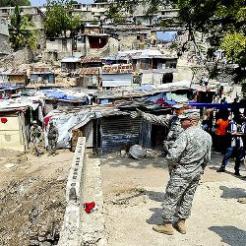Andrew Chaggar reports for the last time this year from the frontline in Haiti, where he has led a team of European Disaster Volunteers. Here he explains why he is leaving the country, despite it being in need of further assistance.
Last month I discussed how many NGOs are currently scaling back or ending their operations in Haiti due to dwindling funds or a desire to hand over responsibility to local actors. With so much need still remaining I noted that this could lead to potential problems with the ongoing recovery process, but that ultimately NGO withdrawal was inevitable.
Overall the question many NGOs face is not whether they should withdraw but at what point is the right time to do so?
While I can’t speak for others, this is an issue that is currently very relevant to me. Next week, after 18 months in Port-au-Prince, our charity will end its international volunteer operations in Haiti. While our education programmes will be continuing under the leadership of local staff and partners, our construction projects will be completed and my own full-time presence in the country will end.
This undoubtedly marks a big change for our Haiti operations and the decision to withdraw our international volunteers was discussed at length. We were tempted to extend volunteer involvement into next year but after considering all the factors it was decided 1 December was the right time for us.
In our case, funding for Haiti is secure in at least the medium-term, but with uncertainty remaining in the long-term, we opted to set priorities, consolidate our resources and focus our ongoing support in what we consider the most critical areas.
Achieving the right balance between trying to help as many people as possible while not spreading resources too thinly presents difficult choices. I’m sure that, wherever they work, many charity managers face similar dilemmas. This is something we’ve had to consider throughout our time in Haiti but became even more relevant as we evaluated the ongoing role of international volunteers as managing their involvement takes a lot of capacity.
While we’re a volunteer-driven organisation at heart, we’re also very heavily focused on sustainability and we’ve always intended to hand over our long-term programmes at some point. So when it became clear we had reached the point where we could do more good through local actors we decided to make the transition and set a date for withdrawal.
As we’ve always planned to transfer responsibility to local staff and partners we’ve obviously been working on capacity-building throughout our time in Haiti. Actually making the transition is of course nerve-wracking in some ways but, while some doubts are natural, in my experience it’s a very rare and lucky aid-worker who leaves an assignment without feeling they could have done just that little bit more.
Withdrawal is never easy
Choosing the right time to withdraw is never going to be an easy decision to make. Even if the situation is not forced, such as due to funding constraints, priorities will always need to be set and trust will need to be placed in those assigned to take on responsibility. The factors considered in making the decision to leave are, by their nature, going to be complicated and also specific to the NGO in question.
Some of these factors may relate to the organisation itself as well the status of its in-country programmes. In our case for example we’re obviously committed to our beneficiaries in Haiti and aim to continue our support, albeit in a less hands-on role, for at least the next five years. However, we’re also still a relatively new charity and have much work to do in terms of our own organisational development. This need to build our own organisational capacity inevitably had some influence in our decision to withdraw our international presence from Haiti.
Overall, responding to disasters requires you to find the right balance in many different ways; between providing help without creating dependency; between being passionate about your cause without losing objectivity; or between trying to help everyone a little or a smaller number a lot. Choosing the right time to leave presents particularly difficult choices, however, as once you do, it’s much harder to make changes or correct mistakes.
Only time will tell how well we, or other organisations, have executed our exit strategies. In the interim though I wonder if I’ve got time to do that one last mini-project I was planning?..
As I’m leaving Haiti this will be my last blog “from the frontline” for a while. However I’m planning on continuing to write for Civil Society as we continue our organisational development. I hope you’ll continue to check in as we re-examine our charity’s governance, fundraising and business planning before launching our next overseas response.









